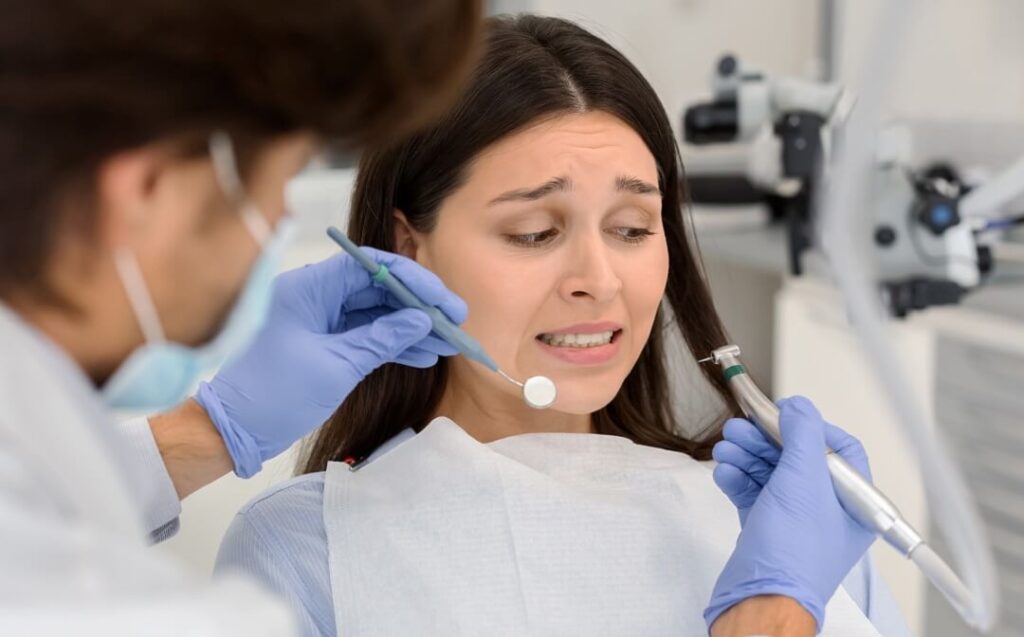
Dentophobia (Fear of Dentists)
Dentophobia is a fear of the dentist. People with this specific phobia feel anxious when they think about going to the dentist or actually visit the dentist. Past negative experiences, family history or feeling a loss of control can lead to dentophobia. Exposure therapy, guided imagery and relaxation techniques can help you overcome this disorder
What does a person with Dentophobia fear?
Someone with dentophobia may be afraid of:
- Anesthetic: People usually aren’t fearful of getting an anesthetic (numbing drug), but instead, fear the anesthetic not working. Some people fear side effects of the anesthetic, such as temporary numbness of their lips.
- Blood: Some people have a fear of blood (hemophobia). They may feel afraid or panicky about the possibility or actual presence of even minor bleeding that can happen during a dental procedure.
- Choking: People may fear gagging or choking when the dentist numbs their mouth. They may fear not being able to breathe or swallow.
- The dentist: People may associate negative feelings with their dentist. These feelings may be worse if they’ve had a bad experience with a dentist in the past.
- Feeling pain: Dental procedures fairly often involve a small amount of pain. And sometimes, the procedure or recovery does hurt. People who’re highly sensitive to pain may be more fearful of feeling discomfort during their dental treatment or as a result of it.
- Needles: People afraid of needles may fear the injections dentists use during dental procedures.
- Noise: Someone may fear the noise made by drills and dental instruments used by the dentist or dental hygienist.
- Smells: People may become anxious due to how the dentist’s office smells or the specific aromas that arise during dental treatment.
Symptoms and Causes
Dentophobia is a fear of the dentist. People with this specific phobia feel anxious when they think about going to the dentist or actually visit the dentist. Past negative experiences, family history or feeling a loss of control can lead to dentophobia. Exposure therapy, guided imagery and relaxation techniques can help you overcome this disorder
What are the causes of dentophobia?
Possible causes of dentophobia include:
- Family history: Your risk of having a phobia increases if you have a parent or family member with a phobic disorder or anxiety disorder. You may have more anxiety than other people if you have a gene mutation (gene change).
- Feeling embarrassed: You may feel strange about the dentist or hygienist being so close to your face. You may also feel worried about how your teeth look or how your breath smells.
- Feeling helpless: The experience of lying in the chair and having your mouth open for an extended period can make you feel a loss of control.
- Modeling: Hearing someone talk about their fear of dentists can spark the same phobia in you.
- Past negative experiences: People who have had a negative traumatic experience related to going to the dentist may develop dentophobia. Traumatic experiences may include being afraid of going to the dentist as a child, having dental procedures performed without your consent or having a procedure that caused pain or complications.
- Traumatic history: A history of abuse, such as bullying, child abuse or sexual violence, can lead to dentophobia.
What are Dentophobia symptoms?
Dentophobia symptoms can range from mild to extreme. They include:
- Chills.
- Dizziness and lightheadedness.
- Excessive sweating (hyperhidrosis).
- Heart palpitations.
- Nausea.
- Shortness of breath (dyspnea).
- Trembling or shaking.
- Upset stomach or indigestion (dyspepsia).
In addition to the above symptoms, dentophobia triggers may cause some people to:
- Cry when thinking about visiting a dentist.
- Have insomnia before a dental appointment.
Diagnosis and Tests
How is dentophobia diagnosed?
Your dentist or healthcare provider may suggest that you see a mental health professional like a psychologist. This healthcare provider can formally evaluate your symptoms, including how the phobia impacts your daily life.
You may have this specific phobic disorder if your fear of dentists:
- Occurs when you think about visiting or go to visit the dentist.
- Prevents you from seeing a dentist, even when you’re in pain or need urgent treatment.
- Triggers symptoms of anxiety or fear that don’t match the actual danger.
- Lasts at least six months.
